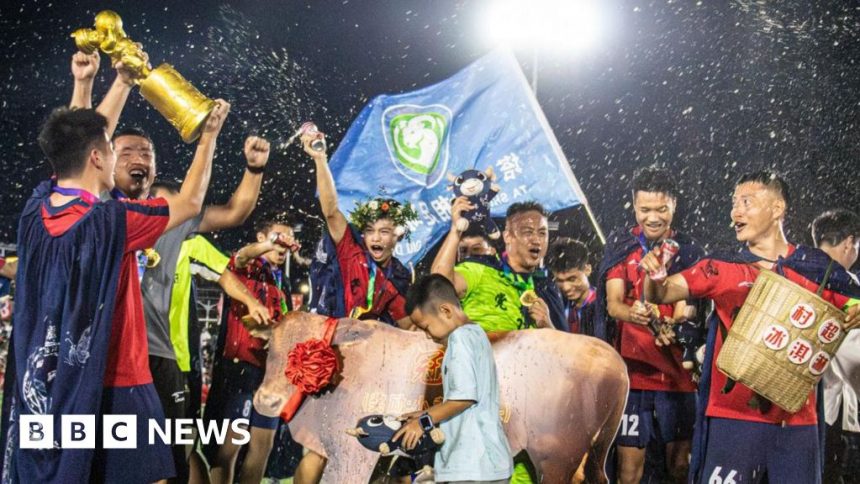Farmers and students star in China’s viral new football league
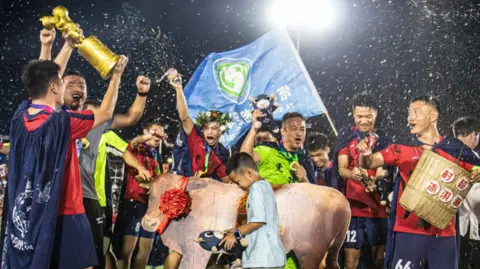 BBC/Katherina Tse
BBC/Katherina TseIt is a hot night and thousands of fans have packed into Rongjiang’s football ground for the final of the Guizhou Village Super League.
Dongmen village is up against Dangxiang village in the climax of this hyper rowdy, very local competition.
This small, weekly, village football festival has become a viral sensation in China, as images have spread across social media of fans dressed in traditional ethnic costume, banging drums and cheering on the players who might be farmers, students or shopkeepers.
And these videos have inspired tens of thousands of people from across the country to experience it for themselves on any given weekend.
Watching the matches in the village league is free but it is quite a hike to get here, a three-hour drive into the mountains from the provincial capital Guiyang.
Yet millions of Chinese tourists have made the trek over the last 12 months, to soak up the atmosphere, boosting tourist industry revenue by nearly 75%, according to official figures quoted by state-run media.
The accommodation available is basically small hotels which are often fully booked when the big games are on.
It’s the ultimate underdog story.
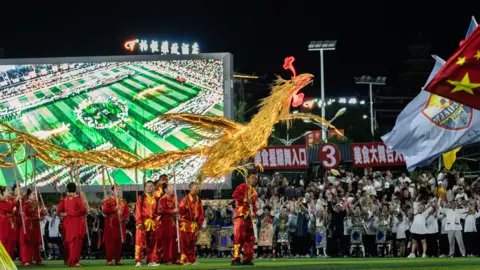 BBC/Katherina Tse
BBC/Katherina TseThis is an area which was one of the last parts of China to be officially declared free of “extreme poverty”.
Five years ago its average annual disposable income was just $1,350 in rural areas. Now, this newly organised league – only in its second year – has attracted so much fame it is transforming the place.
The players can’t quite believe it.
“We’re not professional footballers. We just love footy,” says Shen Yang.
“Even if there was no Village Super League, we’d play every week. Without football, I’d feel like life had lost its colour.”
Shen is a 32-year-old hospital maintenance worker who’s just come off an all-night shift, but, on the field, he is one of the main attacking weapons for Dongmen village.
He says his parents hated him playing football when he was a kid but now they’re total converts.
“They didn’t let me play. They threw away my trainers. But now they’ve set up a stall at the gate to the stadium selling ice creams,” he laughs.
Shen’s parents are not the only small business owners who have benefited from the economic boost this competition has brought to the area.
It is not as if everyone has suddenly become rich, but this sporting carnival has definitely brought earning opportunities for those running little family hotels, restaurants and street stalls.
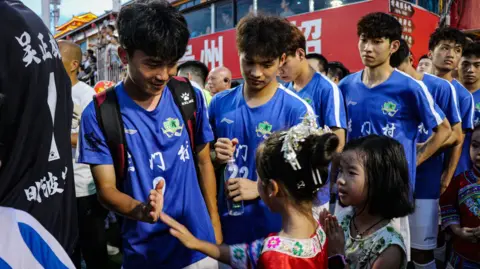 BBC/Katherina Tse
BBC/Katherina TseDong Yongheng, a player whose Zhongcheng village was in the final last year, is among those who have benefited from the tournament way beyond his experience on the pitch.
The former construction worker has turned footballing limelight into family business success.
The 35-year-old once worked in his auntie’s modest shop preparing rice rolls, a famous Rongjiang street snack.
Now he has opened his own, multi-story restaurant. It even has a shop attached to it selling his team’s football jerseys and other memorabilia.
“I think people like the authenticity of the village league,” he tells the BBC.
“It is really not because of our sporting skills. They like seeing a genuine performance, whether it is by our cheerleading ethnic singers or our players. Tourists love real and original things.”
The government says that more than 4,000 new businesses have registered in the region since the competition started last year, creating thousands of new jobs in the poor farming community.
That some fans dress up in traditional clothing to cheer on their village team has definitely given this tournament a unique flavour.
In the hours before the final, Pan Wenge’s silver headdress jingles and jangles as she speaks enthusiastically, preparing to cheer on Dongmen village.
“When we watch the game, it’s so exciting. We’re really nervous, you feel your heart pumping. And, when we win, we’re so happy. We sing and dance.”
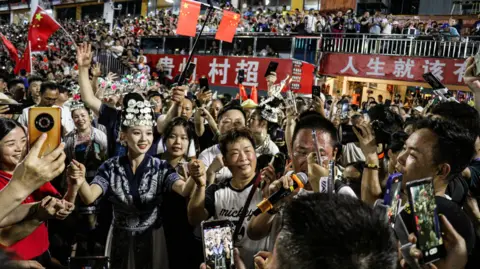 BBC/Katherina Tse
BBC/Katherina TseBut standing in Dongmen’s way is the younger, faster Dangxiang village team.
Their star striker, Lu Jinfu, the son of itinerant labourers, has just finished high school. With a shy smile he acknowledges the attention of local kids wanting to take selfies with him.
“When I started playing I didn’t expect it to be like this. I didn’t expect us to have such an amazing football atmosphere,” he says.
On the night, his team are indeed too good for Dongmen. Lu scores twice and, after the full-time whistle, the winning team spray each other with soft drinks in celebration.
But the losers don’t go home empty handed.
“We won two pigs. That’s not bad,” Shen Yang says with a cheeky smile.
And, at their party afterwards, you would not think they were the runners-up.
There is much eating and drinking in an outdoor banquet down the main street of Dongmen village.
The players get hugs and kisses from their neighbours they refer to as “aunties”. Win, lose, or draw, they’re still seen as heroes.
And, after all, there is always next year.



